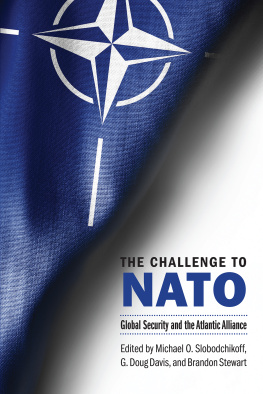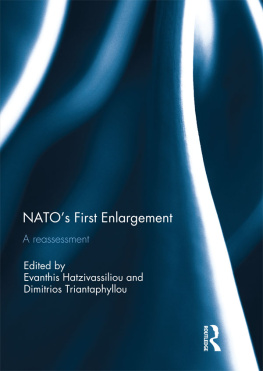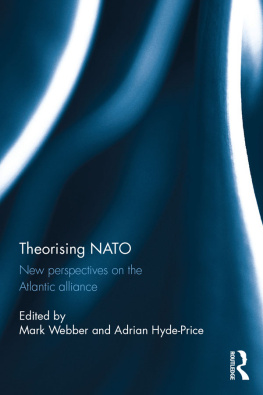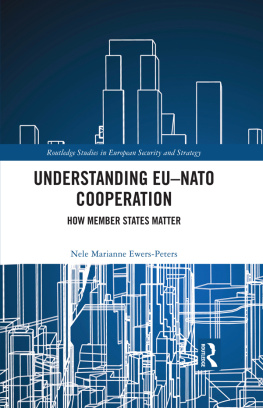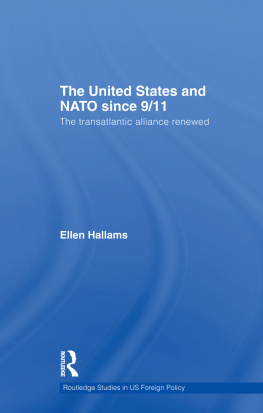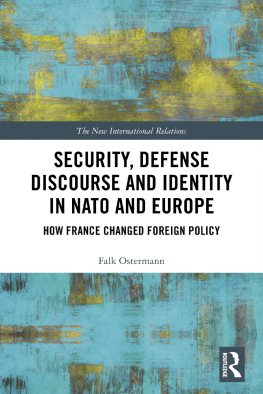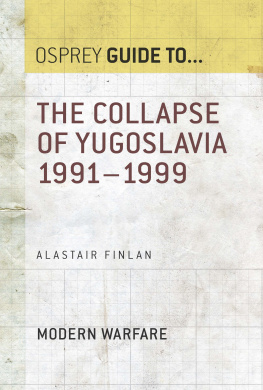NATOs PEACE-ENFORCEMENT TASKS AND POLICY COMMUNITIES: 19901999
NATOs Peace-Enforcement
Tasks and Policy Communities:
19901999
GIOVANNA BONO
Bradford University, UK
Giovanna Bono 2003
All rights reserved. No part of this publication may be reproduced, stored in a retrieval system or transmitted in any form or by any means electronic, mechanical, photocopying, recording or otherwise without the prior permission of the publisher.
The author has asserted her moral right under the Copyright, Designs and Patents Act, 1988, to be identified as the author of this work.
Published by
Ashgate Publishing Limited
Gower House
Croft Road
Aldershot
Hants GU11 3HR
England
Ashgate Publishing Company
Suite 420
101 Cherry Street
Burlington, VT 05401 -4405
USA
Ashgate website: http://www.ashgate.com
British Library Cataloguing in Publication Data
Bono, Giovanna
NATOs peace-enforcement tasks and policy communities:
19901999
1. North Atlantic Treaty Organization 2. Peacekeeping forces
I. Title
355.031091821
Library of Congress Cataloging-in-Publication Data
Bono, Giovanna, 1964
NATOs peace-enforcement tasks and policy communities: 1990-1999 / Giovanna Bono,
p. cm.
Originally presented as the authors thesis (doctoral)--University of Kent, Canterbury (UK).
ISBN 0-7546-0944-8 (alk. paper)
1. North Atlantic Treaty OrganizationOrganization. 2. North Atlantic Treaty Organization-Military policy. 3. Peacekeeping forces. I. Title.
UA646.3 .B565 2002 949.703-dc21
2002025858
ISBN 0 7546 0944 8
Typeset by Martingraphix.
Printed and bound in Great Britain by MPG Books Ltd., Bodmin, Cornwall.
Contents
Why has The North Atlantic Treaty Organization (NATO) managed to transform itself into a peace-keeping/peace-enforcement organisation in the 1990s? A variety of answers are available. Some analysts stress the fear of threat and spillover of conflicts outside NATOs borders, others the role of organisational and institutional dynamics. More recently, the theory of humanitarian intervention has been used to explain NATOs war over Kosovo.
By combining assumptions from transgovernmental coalition and epistemic communities literatures, this book tests the above-mentioned predominant explanations by advancing the hypothesis of the existence and role of policy communities defined as:
an alliance between sections of national government (composed of officials and politicians) and sections of an international bureaucracy. Members of policy community have in common shared belief-systems and perspectives on a number of foreign policy and security issues. They influence the policy-making process by intervening in setting agendas and proposing measures during periods characterised by high-level disagreement among political leaders at the international level.1
The hypothesis is tested by examining the attitudes and strategies of NATO international staff, along with British, German and US policy-makers during two case-studies: one covering NATOs activities between 1990 and 1995; the other examining the Western Alliances response to the Kosovo crisis between January 1998 to March 1999.
The results show that the hypothesis of the fear of threat cannot explain the NATOs initial decisions to intervene in the Balkan conflict. Nor can it account for NATOs war over Kosovo. Similarly the research findings do not support the theory of humanitarian intervention. In contrast, the results highlight the fact that there were policy communities that influence the policy-making process. They were able to do so partly because of the existence of favourable domestic and international circumstances.
In the first case study we demonstrate that, next to the role of policy communities, there were organisational and competitive intra-institutional factors in operation. The strategies pursued by the policy community were facilitated by the fact that Western policy-making towards the Balkan wars was driven by ad hoc reactions to events. In addition, Western policy towards the Balkans was closely linked with the planning for the restructuring of NATO forces and posture.
In the second case study, next to the role of a policy community and domestic factors there were other dynamics in operation: the impact of diplomatic and military lessons learnt from Western intervention in the Bosnian wars (19921995); the influence of attempts to establish a new transatlantic burden-sharing arrangement; the Serbs strategies against the Kosovo Liberation Army (KLA) and Kosovo Albanian civilians.
The findings highlight the role of the NATO international military structure and the ability of NATO officials to build transgovernmental and transnational coalitions under specific circumstances.
The research for the case studies is based on primary sources (official documents and memoirs) and on news reports. Extensive interviews were undertaken with NATO and Western European Union (WEU) officials along with politicians and experts.
This book began its life as a PhD thesis at the University of Kent in Canterbury (UK), written under the supervision of Professor John Groom, Dr Thomas Saalfeld and Mr Dan Hiester. Each one of my supervisors inspired and encouraged me to complete my research. The book was revised during a Research Fellowship in the Peace Studies Department at Bradford University in the UK.
Giovanna Bono
1 This definition belongs to the author and is developed in the Introduction.
ACCHAN | Allied Command Channel |
ACE | Allied Command Europe |
ACLANT | Allied Command Atlantic |
ACTORD | Activation Orders |
ACTWARN | Activation Warning |
AFT | Allied Tactical Air Force |
AMF | Allied Mobile Force |
ARFPS | ACE Reaction Forces Planning Staff |
ARRC | ACE Rapid Reaction Corps |
ATAF | Allied Tactical Air Force |
AWACS | Airborne Warning and Control Systems |
BAOR | British Army of the Rhine |
BDF | Bosnian Defence Force |
BiH/HVO | Bosnian Government Forces and Bosnian Croats Forces |
BMV | Bundesministerium der Verteidigung [German Ministry of Defence] |
BSA | Bosnian Serbian Army |
CAS | Close air support |
CDS | Chief of Defence Staff |
CDU | Christian Democratic Union [Germany] |
CFSDP | Common Foreign Security and Defence Policy |
CFSP | Common Foreign and Security Policy |


